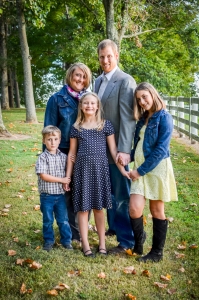“You know how I learned about tithing? I was a kid and our family was on a fixed income but every other week, when the paycheck came, I remember seeing my dad and mom sit down at the kitchen table and lay out all the bills. I would watch my dad pull out the checkbook and the first check he wrote was to the church. Before they paid any other bills, he made sure he gave his money to God.”
This is a true story, shared with me by an older woman and a dear friend. Notice what she said. Or more precisely what she didn’t say. She said she learned about tithing from her parents. But not from a devotional or a faith talk. She learned it by watching her parents do something, week after week, living by faith, in front of their children.
Their actions were the lesson. Their consistency was the testimony. And their faith? That was what talked; that’s what spoke the loudest.
We know this, right? We know that our actions speak louder than words. We know that our children are always watching us. We know that the lessons we don’t necessarily plan in advance become the moments that are most defining.
But do we really know it? Do we know it enough to consider how the rhythms of our life are transforming and forming how our children approach life and view this world? Are there things that our kids would say, “We always do that”? Things that help create the essence of our homes, the very identity of who we are as families. I
n a previous post, I wrote:
For family, this means we create an identity that becomes central to our character and meaning as a unit. It communicates to the world “This is WHO we are, WHAT we stand for, and HOW we do life.” It becomes our family’s DNA and what our kids look to and say, “This is part of what it is to be an (insert last name here).”
Our children are learning life from how we live our life.
Our simplest routines, our approach to successes and failures, our kneejerk reactions and our carefully planned schedules – all of it is being watched and processed by our kids.
So what can we do?
Be Aware
I think the first thing we need is just to be aware of what our family’s “always” are. One fun way to find out is to get a posterboard, some markers, and your family and gather around the table to answer this question, “What makes us…US?” In other words, have your kids tell you what your identity is by drawing it on the posterboard. What the the things we always do and the things we always say and the ways we always act? Then look at the picture you’ve created. Be aware that these are the avenues through which you are influencing your children.
When our family did this very thing, one thing that became apparent is that our kids had picked up on besides our faith is our high regard for education, for entertaining guests, for travel, for family time, and for good food. These are areas where they are watching and learning from us, their parents. Being aware of this has helped us to be more aware of our own actions and words in these areas.
Be Intentional
Sometimes, rhythms and routines don’t just naturally happen. Sometimes, we need to intentionally created structure around those things. We can even create a whole language to describe them. For instance, our whole family knows what an “Oh Yeah Dance” is and where it started; we know what is going to happen at a family meeting; and we know what a “Daddy/daughter or Mommy/Son” date is going to look like. We have been intentional in creating these places where learning and loving (discipleship) can take place.
It can be important to create spiritual routines that, as Reggie Joiner (2009) says in his book Think Orange, fit with the rhythm of our life. For instance, it can become routine for us to start or end our day with prayer. Maybe our routine is cleaning up dishes together as a family or reading a piece of Scripture at each meal. These routines should be “expected” at some part of just normal daily life but guess what, to get there, you have to start here, with intentionality and a bit of planning.
Be Redundant
Remember the original story? Every two weeks this woman watched her parents pay bills and write their tithe check. It was a repetitive and recurring lesson. More impacting than that is this command in Deuteronomy 6:7 “talk of them (the commands of the Lord) when you sit in your house, and when you walk by the way, and when you lie down, and when you rise.” I don’t know about you, but I’m pretty sure these are moments that repeat every day. These daily repetitive moments are the times God has given us to lead our children to Him.
The thing about redundancy and repetition is that a lot of learning takes place there. Studies show that “the more something is repeated, the more likely children are to remember it. Repetition in a variety of forms also increases the likelihood of reaching children with different learning styles and provides a more comprehensive understanding of concepts.” So be boring – be redundant – be the best teacher.
It’s kinda scary, right? Huge responsibility.
But also, pretty cool right? Our kids are growing in their faith and character every day, and we, as parents, have the greatest influence on them – greater by far than their friends, their teachers, and even their TVs. S
o, let’s be aware; let’s be intentional; and even if it seems super boring, let’s be redundant. Because, they are always learning and we are always teaching.
For more information about
- Kids in Worship
- Determining which Type of Family Ministry model works best for your church
- Discipleship in Intergenerational community
- Encouraging the continued conversation through Practical Discipleship at Home
- Seminars, Workshops, Coaching
Check out to ReFocus Ministry or “like” our Facebook page. Join our conversation at theReFocus Family and Intergen Ministry group on Facebook.
About the author
Refocus Ministry was started by Christina Embree, wife to Pastor Luke, mom to three wonderful kids, and family minister at Nicholasville UMC. She is passionate about seeing churches partnering with families to encourage faith formation at home and equipping parents to disciple their kids in the faith. Currently studying Family, Youth and Children’s Ministry at Wesley Seminary, she also blogs at www.refocusministry.org and is a contributing blogger at D6 Family, Seedbed, and ChildrensMinistryBlog.com




1 Comment